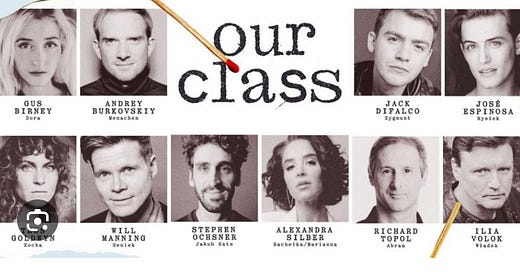Poland has a deep-rooted history of antisemitism. This reached a climax in the 20th century, when upwards of 90 percent of the country’s Jews were killed during the Holocaust.
But even before the mass exterminations began in 1942, isolated incidents were occurring in villages across the country. One of the most infamous took place in Jebwadne, which is the subject of Tadeusz Slobodzianek’s “Our Class” at BAM.
Ten classmates—half Jewish, half Roman Catholic—live in relative harmony until 1935, when Prime Minister Pilsudski, a protector of the Jews, dies. Suddenly the Roman Catholic kids in Jebwadne start picking on their Jewish classmates. This gets worse after 1939, when the Molotov-Ribbentrop Pact is signed and the Russians invade eastern Poland where Jedwabne lay.
At first the Jews welcome the Soviets as the lesser of two evils. Some of the Jewish classmates even join the Communist party. The Poles never forget what they see as treachery, and when the tide turns and the Nazis invade in 1941, they have their revenge.
Young Jakob Katz (Stephen Ochner) is stoned to death by his classmates. Dora (Gus Birney) is raped by three others. In June the rest of the 1600 Jews in the village are rounded up and made to clean the cobblestone streets with spoons. Then they are marched into a barn, which is subsequently set aflame.
Menachem (Andrey Burkovskiy) is hidden in a hayloft for the duration of the war by Zocha (Tess Goldwyn), a Gentile classmate. Rachelka (Alexandra Silber) is given the chance to survive, but only if she marries Zigmund (Elan Zafir) and converts to Catholicism.
The remainder of the play is set in post-war Poland and deals with the efforts to extract justice from the collaborators. Suffice to say, every survivor—both Jewish and non-Jewish—faces an unhappy future.
“Our Town,” a production of the Arlekin Players Theatre, is not for the faint of heart. The violence of the Poles against their Jewish classmates is at times unwatchable. Also, Jan Pappelbaum’s set includes a large blackboard that serves as a wall on which the names of the dead are scrawled along with their date of death.
Everyone associated with his play—from the playwright to director Igor Golyak to BAM itself—should be commended for dramatizing such a tragic event which is still being debated up till the present. Kudos to the cast—besides those mentioned above, Richard Topol is outstanding as Abram, a character who left for America in 1937 and who serves as the unofficial narrator.
So why see this play? To be reminded, as George Santayana once said, that those who do not remember history are doomed to repeat it. Seems especially relevant now when the world seems all too willing to forget it.
Like this review? Follow me at “What Does Aug Think?” at acsntn.substack.com. Thank you!




I saw the BAM production today and left at intermission. It was very poorly acted and in many ways pornographic. Enough already. Let's find ways to remember that don't play the same old trops. When do we say NO, not only to the forces that repeat these atrocities but a theater that gloats in them.